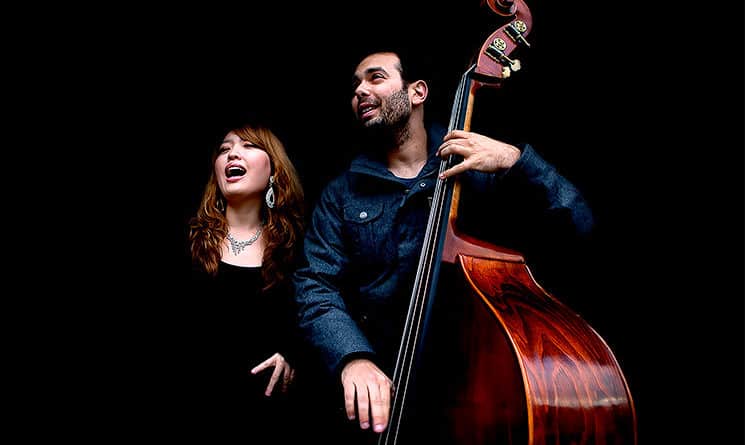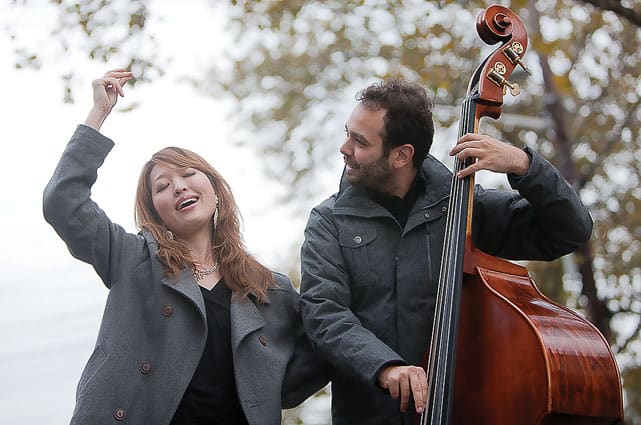Ehud Ettun and Haruka Yabuno met each other for the first time five years ago outside the New England Conservatory in Boston. Yabuno, a pianist from Japan, was studying at Berklee College of Music, and Ettun, a bassist from Israel, was a student at the conservatory. A mutual friend brought them and a few other musicians together for their first jam session in America, but there was one small problem: neither spoke English.
“We barely said hi to each other,” Yabuno says.
They went inside and found a classroom anyway, and once the music started, everything clicked.
“We started playing, and it came out pretty well. And so we started playing together,” Yabuno says.
That jam session helped the two find a common language in jazz. It also marked the start of Ettun and Yabuno’s ongoing collaboration — the two musicians have been playing throughout New England ever since as The Yabuno Ettun Project. Last year saw the release of their first album, “BiPolar,” and this summer, they’re embarking on their first international tour, which takes them to their home countries, with a few stops in Europe along the way. Before they set off, though, they’re stopping in Kittery, Maine, where they’ll perform at The Dance Hall on Friday, July 17. The Sound recently spoke to the two via Skype.
“We’re both inspired by jazz,” Ettun says. “We’re interested more in improvisation and music that is not necessarily straight ahead jazz. So I think we connected on that.”
“Musicians who improvise a lot with other people, they take this as a lesson for life and understand the huge power that curiosity can have.” — Ehud Ettun
It’s a connection that comes through in both their live performances and on “BiPolar.” Ettun and Yabuno view music as an ongoing conversation, and when they play together, the bass and piano blend seamlessly. They’re always talking with, and never at, each other.
“We try to be flexible, to feel the situation and feel the moment, (and see) what’s the right thing to do at the time. Sometimes it works great, and sometimes it doesn’t,” Ettun says.
They used a similar approach when recording their first album. “We didn’t decide anything (beforehand), even the songs to play,” Yabuno says.
Ettun sees improvisation as a sort of international language among musicians, one that bridges language and cultural barriers. When musicians from different countries start performing with each other, “the things we don’t have in common actually become advantages for both of us,” he says. “Musicians who improvise a lot with other people, they take this as a lesson for life and understand the huge power that curiosity can have.”
“Japan and Israel, in a way, they’re almost polar opposites,” Ettun says. “Japanese people are so polite … and Israeli people are so in your face sometimes. But, surprisingly, we found a lot of similarities … in musical taste, in influences, in the way we approach music. … It’s a little bit crazy, because it’s that different, but that close.”
For Yabuno, studying at Berklee meant learning how to be more open to improvisation and collaboration. Japan’s jazz scene is more about imitating older recordings, she says, and improvisation is rare.
“It was really interesting to play with (Ettun and other musicians). The more I play with them, the more I feel comfortable with opening up. That’s one of the things about jazz and improvisation,” she says.
Now based in Boston after a brief stint in New York, the two have been playing on small tours throughout New England for the last few years, slowly branching out from Boston and New York to Maine, Canada, and other locations.
In between shows, Ettun and Yabuno have been prolific individually. They have their own trios that they perform with; Ettun also has his own record label, Internal Compass Records, and performs with the Pisco Trio with Jorge Perez Albela and George Garzone, as well as with pianist Bert Seager’s group The Why.
The upcoming tour marks Ettun and Yabuno’s first time bringing their U.S.-born collaboration overseas, and, according to Ettun, it’s the “closing of the first stage of this duo.” The tour will take them to Israel, Europe, and Japan, and they’ll return to New England this fall.
“We have a plan to record an album with a string quartet,” Ettun says. “After this big tour, we’re hoping to go on an artist’s residency somewhere and just find some quiet time to write.”
The Yabuno Ettun Project performs Friday, July 17 at 8 p.m. at The Dance Hall, 7 Walker St., Kittery, Maine. Tickets are $12 in advance or $15 at the door. Call 207-703-2083 or visit thedancehallkittery.org.


